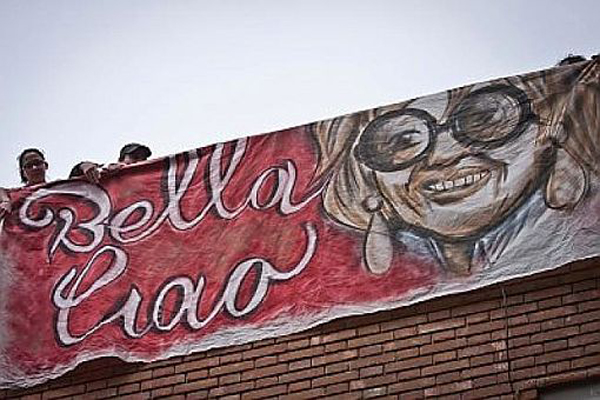Franca Rame belonged to a generation of actors and playwrights in the popular theatre tradition that became politicised after 1968. My parents used to see her perform in the theatres and cabarets of Milan in the late fifties, before they got married. By the early seventies, she had founded, with Dario Fo, the Nuova Scena collective and abandoned the commercial big-venue circuit to perform in prisons, schools and occupied factories. It was around this time that the company staged political works like Fo’s Accidental Death of an Anarchist and began supporting Soccorso Rosso (‘red rescue’), an organisation that offered assistance to incarcerated left-wing militants.
Those things, and being a woman, were her crimes.
We forget, sometimes, some of this history, and how the very existence of feminist spaces and organisations was regarded by some as an open provocation, like racially mixed couples or countless other open expressions of oppressed identities in different times and places. This led to a number of violent attacks, like the time when a neofascist commando headed by Giusva Fioravanti assaulted Radio Città Futura with machine guns, gravely injuring two of the four women in the studio.
But this was later. On 9 March 1973, while out walking in Milan, Franca Rame was pushed into the back of a van by a group of five men, then raped and tortured. They abandoned her in a park, after dark. From there she walked – how long, she couldn’t tell – until she found herself near the central police station. Leaning against the building across the road, she thought of the kind of questions that would be asked to her. ‘I’ll report them tomorrow,’ she decided.
We know something else about that day, through the testimony given twenty-five years later by an officer to public prosecutor Guido Salvini: when the news that Franca Rame had been raped reached the headquarters of the Pastrengo brigade of the carabinieri police corps, it was greeted with cheers.
It seems unfathomable: the hatred, first of all, but also the idea that state terrorism would take such a form. The official version of the events established by the judiciary is that Franca Rame was targeted by a group of neofascists and ordinary criminals under instructions from officers of the Pastrengo brigade, which had strong ties with far-right paramilitary groups and carried out smokescreen operations as part of the strategy of tension. However, the only member of the gang whose name is known to the investigators, Angelo Angeli, couldn’t be tried because by now – it was 1998 – the statute of limitations applied. The names of the officers who gave those instructions were never confirmed. Was it General Giovanni Battista Palumbo, who was later found to have belonged to the Propaganda Due masonic lodge? Was it General Vito Miceli, who went on to direct our secret service? No-one was ever convicted.
Franca Rame lived through all this, through that not knowing, and fought back the only way she knew: as an artist, on the stage. In 1975 she included a ten-minute monologue entitled Lo stupro (‘the rape’) in her one-woman play Tutta casa, letto e chiesa, initially claiming that it was a factual adaptation of the testimony of a survivor published in a weekly magazine. Some members of the audience fainted during that first performance. Perhaps most extraordinarily for such a devastating piece, Rame performed the monologue in 1988 on the state television channel Rai Uno, during the enormously popular light entertainment show Fantastico.
It was as if two countries had met that were never meant to: the one that amused itself into a stupor every Saturday night in front of those variety shows, themselves the sad caricature of the theatre that Rame, Fo and the others practiced thirty years earlier; and the country that was still living through the long seventies, scarred, knowing that such things as the use of rape for political ends existed.
You can watch Franca Rame perform Lo stupro, or read the English translation inclusive of the introduction she wrote in the 1980s, which features some of the questions she was asked by the police and investigating judges (with the following, obvious caution: that the words ‘trigger warning’ may never have applied as much as they do to this).
Franca Rame died earlier this year, aged 83. For the last four decades of her life, she added the fight against rape culture to the rest of her political work and her art, always insisting that hers wasn’t a special case. That rape is always a crime of hatred. That it is about power and control. That it is a crime against the person, and not against the abstract notion of patriarchal morality, or against ‘sexual dignity’, as our laws stated. It was at times a lonely battle, one that saw her isolated by her own comrades. But she fought it tirelessly.
I have thought of Franca often this month, as the case of the young rape gang I wrote about for Overland two weeks ago gave way to a discussion of proper, safe ways of dressing (in revivals of that Bob Jones column, which Kirstin Whalen alluded to on this site), or in the blaming of Miley Cyrus videos or the promotion of ‘sexual precocity in kids’, or in countless forms of derailing by the principled defenders of free speech and other abstract notions. The lengths that we will go to for the sake of not talking about what rape is.








